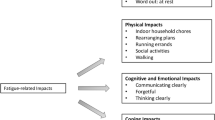Abstract
To evaluate the relationship between disease duration, disability, disease pattern, age and sex with fatigue in MS patients. One hundred and seventy-three clinically definite MS patients and 87 age-matched healthy controls enrolled in this cross sectional study. Demographic data (sex, age), duration of the disease and disease pattern extracted from patient’s files and Kurtzke Expanded Disability Status Scale (EDSS) were recorded for each patient by an expert neurologist. Participants were asked to answer the validated and reliable Persian version of beck depression inventory (BDI) and FSS (fatigue severity score) questionnaires. Mean FSS and BDI scores were significantly different between patients and controls (p < 0.001). Patients with longer disease duration, higher EDSS and progressive type of disease had significantly higher FSS and BDI scores. Although men had higher EDSS, FSS and BDI scores were similar in both sex groups. FSS was significantly correlated with age, disease duration, BDI and EDSS. The analysis of covariance revealed that there is no difference in the covariance-adjusted means for fatigue among two disease groups (relapsing remitting and secondary progressive) except for EDSS. MS patients with longer disease duration, higher EDSS and progressive type of disease suffer from fatigue more than cases with lower EDSS, duration of disease and relapsing type of the disease.
Similar content being viewed by others
References:
Randolph JJ, Arnett PA (2005) Depression and fatigue in relapsing-remitting MS: the role of symptomatic variability. Mult Scler 11:186–190
Ziemssen T (2009) Multiple sclerosis beyond EDSS: depression and fatigue. J Neurol Sci 277(Suppl):s37–s41
Ghajarzadeh M, Sahraian MA, Fateh R, Daneshmand A (2012) Fatigue, depression and sleep disturbances in Iranian patients with multiple sclerosis. Acta Medica Iranica 50:244–249
Codella M, Rocca MA, Colombo B, Martinelli-Boneschi F, Comi G, Filippi M (2002) Cerebral grey matter pathology and fatigue in patients with multiple sclerosis: a preliminary study. J Neurol Sci 194(1):71–74
Tachibana N, Howard RS, Hirsch NP, Miller DH, Moseley IF, Fish D (1994) Sleep problems in multiple sclerosis. Eur Neurol 34(6):320–323
Comi G, Leocani L, Rossi P, Colombo B (2001) Physiopathology and treatment of fatigue in multiple sclerosis. J Neurol 248:174–179
Fisk JD, Pontefract A, Ritvo PG, Archibald CJ, Murray TJ (1994) The impact of fatigue on patients with multiple sclerosis. Can J Neurol Sci 21(1):9–14
Ford H, Trigwell P, Johnson M (1998) The nature of fatigue in multiple sclerosis. J Psychosom Res 45(1):33–38
Krupp LB, LaRocca NG, Muir-Nash J, Steinberg AD (1989) The fatigue severity scale. Application to patients with multiple sclerosis and systemic lupus erythematosus. Arch Neurol 46(10):1121–1123
Möller A, Wiedemann G, Rohde U, Backmund H, Sonntag A (1994) Correlates of cognitive impairment and depressive mood disorder in multiple sclerosis. Acta Psychiatr Scand 89(2):117–121
Vercoulen JH, Hommes OR, Swanink CM, Jongen PJ, Fennis JF, Galama JM et al (1996) The measurement of fatigue in patients with multiple sclerosis. A multidimensional comparison with patients with chronic fatigue syndrome and healthy subjects. Arch Neurol 53(7):642–649
Bergamaschi R, Romani A, Versino M, Poli R, Cosi V (1997) Clinical aspects of fatigue in multiple sclerosis. Funct Neurol 12(5):247–251
Kroencke DC, Lynch SG, Denney DR (2000) Fatigue in multiple sclerosis: relationship to depression, disability, and disease pattern. Mult Scler 6:131–136
Ghassemzadeh H, Mojtabai R, Karamghadiri N, Ebrahimkhani N (2005) Psychometric properties of a Persian language version of the beck depression inventory—second edition: BDI-II-PERSIAN. Depress Anxiety 21:185–192
Azimian M, Farahani AS, Dadkhah A, Fallahpour M, Karimlu M (2009) Fatigue severity scale, the psychometric properties of the Persian-version in patients with multiple sclerosis research. J Biol Sci 4:974–977
MacAllister WS, Krupp LB (2005) Multiple sclerosis-related fatigue. Phys Med Rehabil Clin N Am 16(2):483–502
Kos D, Kerckhofs E, Nagels G, D’hooghe MB, Ilsbroukx S (2008) Origin of fatigue in multiple sclerosis: review of the literature. Neurorehabil Neural Repair 22(1):91–100
Iriarte J, Subirá ML, Castro P (2000) Modalities of fatigue in multiple sclerosis: correlation with clinical and biological factors. Mult Scler 6(2):124–130
Penner IK, Bechtel N, Raselli C, Stöcklin M, Opwis K, Kappos L, Calabrese P (2007) Fatigue in multiple sclerosis relation to depression, physical impairment, personality and action control. Mult Scler 13(9):1161–1167
Flachenecker P, Kumpfel T, Kallmann B et al (2002) Fatigue in multiple sclerosis: a comparison of different rating scales and correlation to clinical parameters. Mult Scler 8:523–526
Mills RJ, Young CA (2010) The relationship between fatigue and other clinical features of multiple sclerosis. Mult Scler 17:406–412
Bakshi R, Miletich RS, Henschel K, Shaikh H, Czarrecki D et al (2000) Fatigue in multiple sclerosis and its relationship to depression and neurologic disability. Mult Scler 6:181–185
Mohr DC, Hart SL, Goldberg A (2003) Effects of for depression on fatigue in multiple sclerosis. Psychosom Med 65:542–547
Lerdal A, Celius EG, Moum T (2003) Fatigue and its association with sociodemographic variables among multiple sclerosis patients. Mult Scler 9:509–514
Conflict of interest
None.
Author information
Authors and Affiliations
Corresponding author
Rights and permissions
About this article
Cite this article
Ghajarzadeh, M., Jalilian, R., Eskandari, G. et al. Fatigue in multiple sclerosis: relationship with disease duration, physical disability, disease pattern, age and sex. Acta Neurol Belg 113, 411–414 (2013). https://doi.org/10.1007/s13760-013-0198-2
Received:
Accepted:
Published:
Issue Date:
DOI: https://doi.org/10.1007/s13760-013-0198-2




